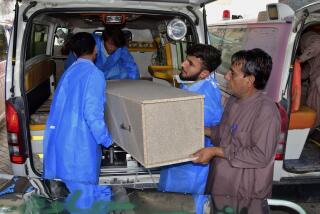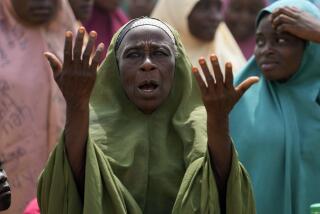Pakistan Watches Karachi Decline Into ‘Kidnap City’
- Share via
KARACHI, Pakistan — Farooq Sumar leaves the Mercedes-Benz locked up in the garage these days. The splendid house he worked his life to afford is now surrounded by armed guards. And he no longer allows his 16-year-old son to walk the one block to the local tennis club. The boy is driven by an armed guard instead.
Ghulam Ahmed, another wealthy industrialist here, keeps a gun in his car. For his daily prayers, he used to drive to the local mosque twice a day. Now he goes only once a week, and with the pistol on his lap. As for Ahmed’s kids, they are told simply to stay home.
And Razzaque, whose Younus Brothers Textile Mills has won him Karachi’s coveted Businessman of the Year award--along with its 1-million-rupee prize money (about $45,500)--every year in the recent past, vehemently declined the honor in September. So did every other big businessman in town. Thank you very much, he told the city’s textile association, but, after all, it cost him 10 times that much in ransom a few months ago to get back his eldest son.
Welcome to “kidnap city.”
In the last several months alone, dozens of businessmen and their children have been snatched from their cars or whisked off the streets of this port city and held for weeks or months by kidnap-for-profit gangs, who have used the ransom money to further expand their illegal arsenals.
“There is a feeling of oppression, worry and tension all of the time,” industrialist Sumar said recently. “The kidnapings have restricted all of our movements. They’ve turned happy people into desperately concerned people.”
Already, hundreds of millions of dollars in ransom have been paid. Millions more have been spent on private security guards and sophisticated alarm systems.
And, with the kidnaping craze reaching epidemic proportions, Karachi’s beleaguered police admit that they are powerless to stop it. They are outnumbered, outgunned, undertrained and underpaid, and the city’s most senior police official conceded that many of his officers actually are getting a cut of the booming trade, leaving victims’ families far more willing to await the kidnapers’ ransom demand than to call the police for help.
As a result, concern is quickly replacing commerce in Pakistan’s largest city. And among Karachi’s rich, who have built this sprawling metropolis of 9 million people into one of Asia’s most important commercial centers over the last several decades, fear has overrun the desire to flaunt their wealth.
“The crux of the problem is the arms,” said Sumar, the owner of a large Karachi textile firm who last month formed a citizens’ organization “for the restoration of law and order” in Karachi and its province of Sind. “There are more unlicensed arms in the hands of civilians now than are issued to all the army and police combined in Karachi.”
Roots in Afghan War
For Khawar Zaman, the city and provincial chief of police, the weapons problem--and, in turn, the kidnaping campaign--ultimately have their roots in what he calls “this damn Afghan war.”
Throughout the decade-old civil war in neighboring Afghanistan, Karachi has been the key link in a U.S.-financed covert arms pipeline to the Afghan rebels, known as the moujahedeen. More than 1 million AK-47 assault rifles have moved through Karachi en route to the rebels. And many have been siphoned off for the local market.
At the same time, thousands of tons of heroin processed from opium grown along the Pakistan-Afghanistan border and destined for markets in America and Western Europe have flowed back through Karachi, bringing huge profits for more guns into the city and the province.
These profits have also helped Karachi’s booming economy, but most of the guns and drugs have found their way into the hands of traditional, centuries-old gangs of bandits known as dacoits, for whom kidnaping has long been second-nature but confined to Sind’s remote interior villages. And the rest went to help arm increasingly militant ethnic groups in a city that one longtime observer once described as “a melting pot where no one has ever really melted together.”
“You know, the staple crime in this province used to be cattle-lifting,” police chief Zaman said. “But now, suddenly, they found there was something far more profitable to steal--and easier too.
“We’ve got some damn good cattle tracers. But people are a lot harder, especially now with all these guns everywhere. And there is now a new dimension of politics in these kidnapings, because there is no question some of these ethnic groups are indulging in it.”
Zaman said that he is certain that the kidnaping gangs are using the huge ransoms they have collected--as much as $700 million in the last six months alone--to buy more and more arms, creating a vicious cycle of crime.
“Already we’re outgunned by the kidnapers,” he said. “And the kidnaping is mostly because of the helplessness of the police. We are no longer feared or respected. We’re so undermanned that we have just one policeman for each 520 residents--less than half of the ratio you have in New York City and even New Delhi. Every day, a policeman is getting killed or beaten up.
“And there is no motivation for the policeman,” Zaman added. “He is paid 1,100 rupees (about $50) a month, and with a family of five, he can’t even eat on that salary. So bribery is very much there. As for the kidnaping, some of the people serving in the police are involved. I confess that. But then the question is, what can I do?
“So no one trusts the police when their loved one is kidnaped. They’d rather trust the kidnapers and just pay the ransom,” he said.
Sikander Africa Wala is a case in point, and his kidnaping last August also illustrated the brazenness of the gangs, as well as their method of selecting victims.
Sikander, who was virtually unknown in Karachi society five years ago, suddenly emerged as one of the city’s wealthiest men, buying so many imported Mercedes-Benzes that he became the city’s principal Mercedes-Benz dealer as a sideline.
None of Karachi’s government or police officials will state on the record just how Sikander acquired his wealth, only that the tycoon has “something of an aversion to police in general.”
So, when Karachi’s kidnaping craze began in earnest last June, Sikander hired four armed bodyguards to protect him. Two of the guards were standing right beside him when he was kidnaped near his home by a dozen men.
No one even reported the kidnaping to the police until after the family secured his release, reportedly for hundreds of thousands of dollars in ransom. And afterward, Sikander reportedly refused to give police any information about his captors, asserting that they had vowed to kill him if he revealed their identities.
Even more worrisome than the initial effects of fear among Karachi residents, though, is the long-term impact that the crime wave is likely to have on a city where bank robberies and home burglaries also are increasing rapidly.
Recent clandestine wiretaps by Pakistani military intelligence agents of conversations between kidnapers and victims’ families have disclosed that the city’s university students often are used by the kidnapers. Acting without the permission of the victim’s family, the agents traced one ransom call to a college dormitory, where they later learned that the kidnap victim had been held.
Karachi’s college campuses have become virtual armed camps, where students openly carry firearms. Now there is concern that, with the enormous profits in kidnaping, an entire generation of criminals may be coming out of the universities.
“There are also the long-term economic effects,” said industrialist Sumar.
Describing the investment climate in Karachi as “very, very bad,” Sumar said that 80% of the new factories built in the last three years in Pakistan’s textile industry, the nation’s largest exporter, have been located in the already prosperous northern province of Punjab--not in Karachi, where unemployment has traditionally been the biggest problem.
Many more major corporations that were based in Karachi have fled the country entirely, moving to Canada, Australia, England and Dubai.
“Five years down the line, you’ll be able to compare Punjab to a lot of developed countries. Sind and Karachi will be like Bangladesh,” Sumar said.
And that economic factor has a political consequence.
The biggest beneficiary of the exodus has been Prime Minister Benazir Bhutto’s most powerful foe, opposition leader Nawaz Sharif, who is the chief minister of Punjab.
“The economic power is certainly going to help Nawaz,” said Sumar, who has been an avid supporter of Bhutto and her Pakistan People’s Party.
“The situation is very complex for Benazir. . . .,” he added. “Here comes Benazir with little power and little experience. She is trying to undo 11 years of martial law, and she doesn’t have the tools to do so. The police have been ignored for a decade in favor of the army, so she cannot stop the spiraling crime, and the crime is hurting her badly.
“Frankly,” said Sumar, “I don’t see a way out for her.”
Nor, perhaps, for himself.
Sumar says he knows that he has set himself up by assuming the presidency of the new citizens’ group to help restore law to Karachi. But he said he had little choice.
“I became chairman of this committee by default,” he said. “No one else would do it. Everyone was afraid. And, of course, this high profile is not good.
“But,” he added, “someone had to do it.”
More to Read
Sign up for Essential California
The most important California stories and recommendations in your inbox every morning.
You may occasionally receive promotional content from the Los Angeles Times.













